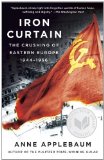Summary | Excerpt | Reviews | Beyond the Book | Readalikes | Genres & Themes | Author Bio

Critics' Opinion:
Readers' Opinion:
First Published:
Oct 2012, 608 pages
Paperback:
Aug 2013, 640 pages
 Book Reviewed by:
Book Reviewed by:
Kim Kovacs
Buy This Book
Five years had passed. In those five years, the Polish Women's League and countless organizations like it had undergone a total transformation. What had happened? Who had caused the changes? Why did anyone go along with them? The answers to those questions are the subject of this book. Although it has been most often used to describe Nazi Germany and Stalin's Soviet Union, the word 'totalitarian' – totalitarismo – was first used in the context of Italian fascism. Invented by one of his critics, Benito Mussolini adopted the term with enthusiasm, and in one of his speeches offered what is still the best definition of the term: Everything within the state, nothing outside the state, nothing against the state. Strictly defined, a totalitarian regime is one which bans all institutions apart from those it has officially approved. A totalitarian regime thus has one political party, one educational system, one artistic creed, one centrally planned economy, one unified media and one moral code. In a totalitarian state there are no independent schools, no private businesses, no grassroots organizations and no critical thought. Mussolini and his favourite philosopher, Giovanni Gentile, once wrote of a 'conception of the State' which is 'all-embracing; outside of it no human or spiritual values can exist, much less have value'.
From Italian, the word 'totalitarianism' spread into all the languages of Europe and the world. After Mussolini's demise the concept had few open advocates, however, and the word eventually came to be defined by its critics, many of whom number among the twentieth century's greatest thinkers. 5 Friedrich Hayek's Road to Serfdom is a philosophical response to the challenge of totalitarianism, as is Karl Popper's The Open Society and Its Enemies, George Orwell's Nineteen Eighty-Four is a dystopian vision of a world entirely dominated by totalitarian regimes.
Probably the greatest student of totalitarian politics was Hannah Arendt, who defined totalitarianism in her 1949 book, The Origins of Totalitarianism, as a 'novel form of government' made possible by the onset of modernity. The destruction of traditional societies and ways of life had, she argued, created the conditions for the evolution of the 'totalitarian personality', men and women whose identities were entirely dependent on the state.
Famously, Arendt argued that Nazi Germany and the Soviet Union were both totalitarian regimes, and as such were more similar than different. Carl J. Friedrich and Zbigniew Brzezinski pushed that argument further in Totalitarian Dictatorship and Autocracy, published in 1956 , and also sought a more operational definition. Totalitarian regimes, they declared, all had at least five things in common: a dominant ideology, a single ruling party, a secret police force prepared to use terror, a monopoly on information and a planned economy. By those criteria, the Soviet and Nazi regimes were not the only totalitarian states. Others – Mao's China, for example – qualified too.
But in the late 1940 s and early 1950 s, 'totalitarianism' was more than just a theoretical concept. During the early years of the Cold War, the term acquired concrete political associations as well. In a pivotal speech in 1947 , President Harry Truman declared that Americans must be 'willing to help free peoples to maintain their free institutions and their national integrity against aggressive movements that seek to impose upon them totalitarian regimes'. This idea became known as 'the Truman Doctrine'. President Dwight Eisenhower also used the term during his 1952 presidential campaign, when he declared his intention to go to Korea and bring an end to the war there: 'I know something of this totalitarian mind. Through the years of World War II , I carried a heavy burden of decision in the free world's crusade against the tyranny then threatening us all.'
Excerpted from Iron Curtain by Anne Applebaum. Copyright © 2012 by Anne Applebaum. Excerpted by permission of Doubleday. All rights reserved. No part of this excerpt may be reproduced or reprinted without permission in writing from the publisher.





The Flower Sisters
by Michelle Collins Anderson
From the new Fannie Flagg of the Ozarks, a richly-woven story of family, forgiveness, and reinvention.

The House on Biscayne Bay
by Chanel Cleeton
As death stalks a gothic mansion in Miami, the lives of two women intertwine as the past and present collide.

The Funeral Cryer by Wenyan Lu
Debut novelist Wenyan Lu brings us this witty yet profound story about one woman's midlife reawakening in contemporary rural China.
Your guide toexceptional books
BookBrowse seeks out and recommends the best in contemporary fiction and nonfiction—books that not only engage and entertain but also deepen our understanding of ourselves and the world around us.